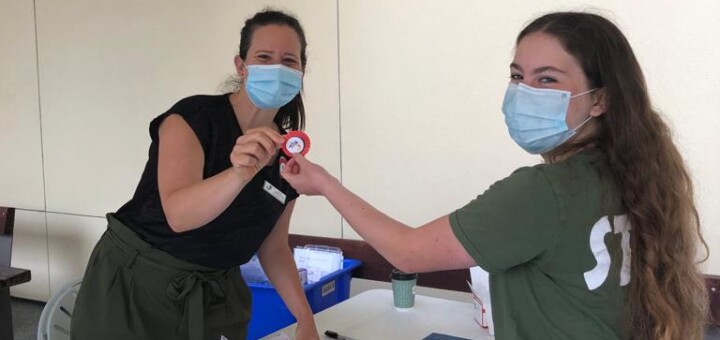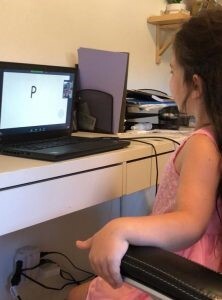Shuli Zilberfarb-Sela from the OFJCC’s Befed Kefet Hebrew Language Afterschool Program shares her personal take on the hardships of this year and how they relate to this week’s Torah portion. This article originally appeared in Hebrew in BAInyanim.
This week’s Torah portion, “Re’eh” arrives for me with perfect timing that relates to our situation. The Torah portion opens like this: “Behold, I have set before you this day a blessing and a curse.” The children of Israel are just before the end of the journey in the desert and about to enter into the Land of Israel. They will come to the Promised Land in which life is an unfamiliar reality full of uncertainty for them. The story opens with God’s demand from the people to make a decision prior to entering the new environment, to a world that has both blessing and curse. The story continues with explanations: a blessing if you have walked in the way of God and the commandments, a curse if you turn away from God.
Like the children of Israel, although we will not really compare five months of the coronavirus pandemic to 40 years in the desert, we too are today on the verge of crossing the river. Are a moment before entering a new and unclear academic environment. An environment that seems almost impossible and has new and binding commandments and laws. Will we accept it as a blessing or a curse. And do we even have a choice? We learn from the story that in the divine vision, the choice is in the hands of each and every one of us. God tells the children of Israel that they have a choice—a blessing or a curse—it is up to you.
Blessing or curse—it depends on us… I also believe that not only do we have a choice, but we have an obligation. An obligation to choose to adopt the new rules and see them as the blessing—they maintain our health. Ours and our children’s. True, we have a lot of frustration with the system, and we wanted more certainty, and more flexibility and more correctness. Now, at the end of the summer (we managed to get through it!), we are on the verge of entering the proverbial Land of Israel. If we choose to enter it in a positive spirit, leave out the great frustration and the desire to blame, we can lead the way for our family and for our community.
It is so important that just before they return to the virtual school, we parents are chosen to embrace with them the mitzvos and laws in humility and completion so that a year and its blessings begin.
A significant difference in the situation is that we do not have “Moshe Rabbeinu.” The commandments and laws come to us from foreign sources and not from a leader whom we followed from slavery to freedom. It is difficult. There is even a crisis of confidence. The Children of Israel were faced with a choice but their starting point is much better than ours. They have a common trust in leadership, acquaintance, culture, history and memory. They are also facing a dream come true, the end of a long journey towards the coveted goal of the Land of Israel. The road was difficult, and even now Moshe is preparing them for the challenges that will come, they are not going out to freedom, they are on the way to fight for the new land, to build houses, an economy. Everything is going to be different. But they have leaders, Moses leaving them with his successor Joshua son of Nun.
And what about us? With us it is more complex, we have less confidence in the leadership. Despite this, I think that even if we [Israelis] do not have representation in the leadership, and even if our connection to local culture and politics is not natural, we have our community. It is an amazing community with action, caring and positivity that pulls forward on so many planes of doing and giving. A big blessing.
Later in the Parsha, Moshe gives the children of Israel some instructions, mitzvot, and equips them with the tools for the new challenge they will face. For the first time they will have land, they will have property, and naturally there will be those who will have more and those who will have less.
One of the commandments that Moses describes in the Parsha is the commandment to care for the poor, for those who have no land and livelihood in the land of Israel: Just as God announced that there is a blessing and there is a curse, God announces here that there will be poor. It is a fact that there are poor people in every human society. In recent months our community has proven that our people have accepted this mitzvah.
More than ever, initiatives have emerged that aim to take care of those who are having a hard time during this complex period. To help those in isolation, to keep in touch with those who need it, to take care of the neighbors, to support them mentally, to remember to call, to walk in the park and be free, to shut themselves together inside and go through it together. Our community, as always, implements and cares and we will understand later what is needed.
This week’s Torah portion begins with the word, “Re’eh,” or “see,” and I want to expand and wish us all to see and feel seen. We will take the reminder that we have a choice. See the options and be able to choose your spirit. This is not a one-time choice, this is an almost daily choice that does not get easier with time and uncertainty. But, I hope we can choose it and succeed in it. To send the kids to the virtual schooling environment with a smile, patience and love. Remember that these amazing children, far from grandparents and the rest of the extended family, are going through the pandemic themselves and choosing daily between a blessing or a curse. We will choose well and demonstrate it for them. We will convey trust in the system, participation and responsibility, and it will permeate them.
Welcome to “Seeing” the sitution with new eyes for all of us, a year of schooling, work and friendship and of course as good health as possible.









Comments are moderated and will not appear immediately.